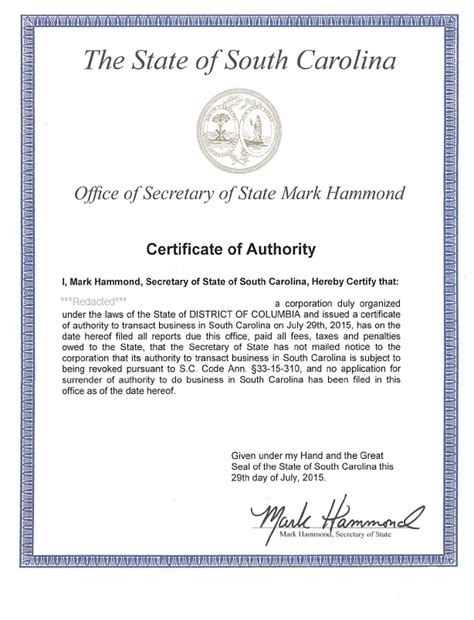North Carolina businesses looking to expand their operations or establish a new entity in the state must obtain a Certificate of Authority from the North Carolina Secretary of State. This certificate is a critical document that allows out-of-state businesses to operate in North Carolina, and it's essential to understand the application process to avoid any delays or complications. In this article, we will guide you through the 5 steps to obtain an NC Certificate of Authority.
What is a Certificate of Authority?
A Certificate of Authority is a document issued by the North Carolina Secretary of State that allows out-of-state businesses to operate in the state. It's also known as a Certificate of Registration or Certificate of Qualification. This certificate is required for all foreign corporations, limited liability companies (LLCs), and limited partnerships that want to conduct business in North Carolina.
Step 1: Determine if You Need a Certificate of Authority
Before starting the application process, you need to determine if your business requires a Certificate of Authority. If your business is already registered in North Carolina, you don't need to obtain a Certificate of Authority. However, if your business is registered in another state and you want to expand your operations to North Carolina, you'll need to obtain a Certificate of Authority.

Step 2: Choose a Registered Agent
A registered agent is a person or business that agrees to receive legal documents on behalf of your business. In North Carolina, you're required to appoint a registered agent who has a physical address in the state. You can choose an individual or a business as your registered agent, but they must be authorized to do business in North Carolina.
Step 3: File the Application
To obtain a Certificate of Authority, you'll need to file an application with the North Carolina Secretary of State. The application must include the following information:
- Business name and address
- Type of business (corporation, LLC, limited partnership, etc.)
- State of formation
- Purpose of the business
- Name and address of the registered agent
- Certificate of existence or good standing from the state of formation
You can file the application online or by mail. The filing fee for a Certificate of Authority in North Carolina is $250 for corporations and $125 for LLCs and limited partnerships.
Step 4: Obtain a Certificate of Existence
A Certificate of Existence, also known as a Certificate of Good Standing, is a document that verifies your business is registered and in good standing in its state of formation. You'll need to obtain a Certificate of Existence from the state where your business was formed and attach it to your application.

Step 5: Receive Your Certificate of Authority
Once your application is approved, you'll receive your Certificate of Authority from the North Carolina Secretary of State. The certificate will include your business name, registered agent information, and the date of approval. You'll need to keep a copy of the certificate with your business records and provide it to any third party that requests it.
Gallery of Printable Certificates





FAQs
What is a Certificate of Authority?
+A Certificate of Authority is a document issued by the North Carolina Secretary of State that allows out-of-state businesses to operate in the state.
Do I need a Certificate of Authority for my business?
+If your business is already registered in North Carolina, you don't need to obtain a Certificate of Authority. However, if your business is registered in another state and you want to expand your operations to North Carolina, you'll need to obtain a Certificate of Authority.
How long does it take to obtain a Certificate of Authority?
+The processing time for a Certificate of Authority in North Carolina is typically 2-3 business days. However, this time may vary depending on the workload of the Secretary of State's office.
Obtaining a Certificate of Authority in North Carolina is a straightforward process that requires careful attention to detail. By following these 5 steps, you can ensure that your business is registered and authorized to operate in the state. Remember to keep a copy of your Certificate of Authority with your business records and provide it to any third party that requests it.
